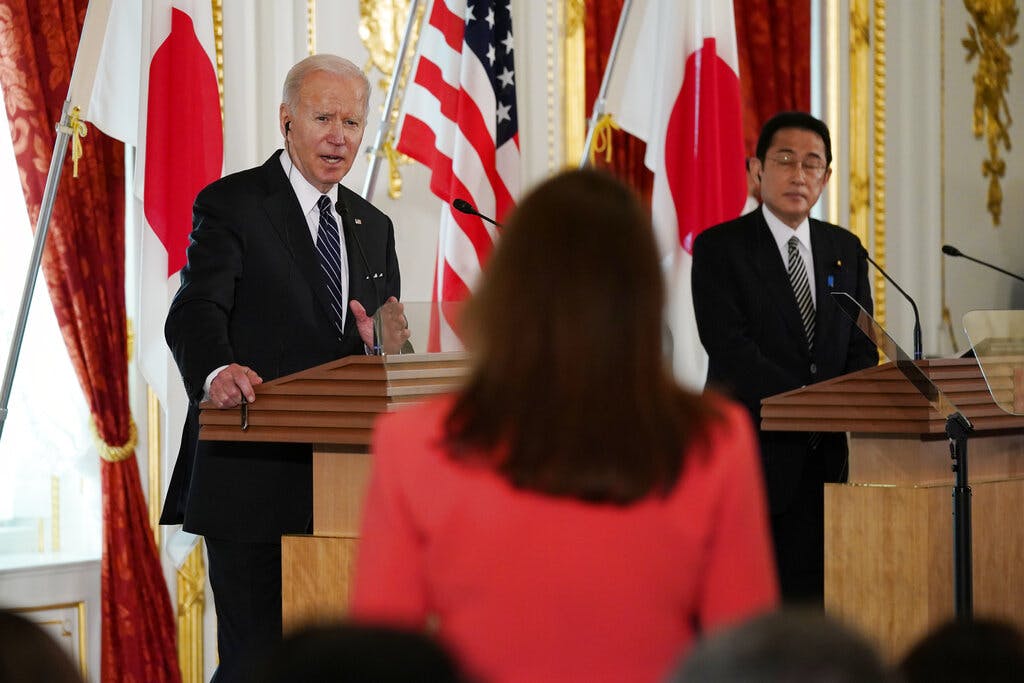Biden’s Effort To Project Firmness Against Communist China and North Korea at Least Pleased Japan
On second glance, though, it did not go much if at all beyond what American policymakers have been saying for years.

President Biden projected a superficial image of firmness in defense of America’s allies against Communist China and North Korea during his five-day mission to northeast Asia while trying not to inflame tensions to crisis levels.
His declaration of Washington’s commitment to the defense of Taiwan no doubt pleased Prime Minister Kishida, standing beside him at Tokyo. On second glance, though, it did not go much if at all beyond what American policymakers have been saying for years.
Taiwan is indeed a province of “one China,” as Mr. Biden pointedly acknowledged, and if China ever does make good on familiar rhetoric and launch an invasion across the 100-mile-wide Formosa Straits, America will come to Taiwan’s rescue.
If that assertion seems bold, remember that China has a significant trade surplus with America and would be loath to sacrifice the golden goose on which it’s been enriching itself for decades. For now, we have to believe China would not do anything so foolish as to attack an island fortress that might well put up a struggle comparable to that of Ukraine against Russia.
Mr. Biden’s seemingly staunch declaration of America’s commitment to Taiwan, however, had to have been what Mr. Kishida wanted to hear. Japan has been increasingly concerned about China aggressively throwing its military weight around in an exercise of intimidation that goes along with China’s power moves throughout the region.
It’s widely believed a Communist Chinese attack on Taiwan could induce Japan simply to abandon the no-war strictures of the post-war constitution imposed on the country while General Douglas MacArthur was running the American occupation.
Japan, limited to spending no more than 1 percent of its gross national product on its euphemistically named “self-defense forces,” would view an attack on Taiwan as an immediate threat to Japan.
The only comparable threat would be for North Korea, supported by China, to invade South Korea, but the American alliance with South Korea makes that possibility far less likely. South Korea not only has a formidable military establishment of its own, including warplanes and missiles capable of hitting anywhere in North Korea, but also could count on the United States to join in its defense.
Plus, America still has 28,500 troops in South Korea. The Seventh American Air Force is based there, and American warplanes would join the defense of the South from bases in Japan and Guam.
Mr. Biden, visiting Seoul before he flew to Japan, was if anything more emphatic about America’s commitment to the South than to any other country in the region. The major takeaway from his meeting with South Korea’s newly inaugurated president, Yoon Suk-yueol, was their commitment to open discussions on resuming live military exercises with troops from the United States and Korea playing war games on the ground, in the air, and at sea.
President Trump canceled the war games after falling “in love” with North Korea’s leader, Kim Jong-un, during their summit in Singapore nearly four years ago that culminated in a meaningless joint statement averring the desire for “denuclearization” of the Korean peninsula.
In Japan, Mr. Kishida was no doubt delighted by Mr. Biden’s soft-spoken acknowledgement of America’s “commitment” to the defense of Taiwan, especially since the Communist Chinese have been conducting aerial exercises quite close to Taiwan and to the nearby Senkaku Islands, which are Japanese possessions disputed by both the People’s Republic of China and the Republic of China.
Japan has a special relationship with Taiwan, dating to Japan’s victory over China in 1895 in the Sino-Japanese War and Japan’s occupation of the island until its surrender at the end of World War II in August 1945. The United States, however, has no troops, not even advisers, on Taiwan and no notion of sending them there.
That’s because, when President Carter transferred diplomatic recognition to Beijing from Taipei, Washington could not be in the position of openly allying with an entity that is technically a part of Communist China. America maintains contact with Taiwan through an American Institute that functions as a de facto embassy.
Nonetheless, Mr. Biden’s seemingly tough view on Taiwan was the highlight of his visit to Japan, in which he introduced the Indo-Pacific Economic Framework, including a dozen countries beside the United States. Washington ballyhooed it as a 21st century economic arrangement, but it was bereft of definite commitments on much of anything.
Details, like “how negotiations will proceed and how agreements will be enforced, remain unclear,” an analysis by Kyodo, the Japanese news agency, said. The overriding question, Kyodo said, was “whether the initiative can become a credible alternative to major regional free trade agreements that the United States has opted out of but Beijing has increasingly sought to join.”
Nonetheless, as a substitute for the Trans-Pacific Partnership, which Mr. Trump gratuitously killed on his first day as president in January 2017, this new grouping did have possibilities. American diplomats, trying to sell the deal to the Japanese media, said it would focus on “fair and resilient trade, supply chain resilience, infrastructure and clean energy, and tax and anti-corruption.”
Sounds good. Now it’s up to Washington and its regional partners to translate the words into action — just as Mr. Biden has promised to do if push comes to shove on Taiwan.

